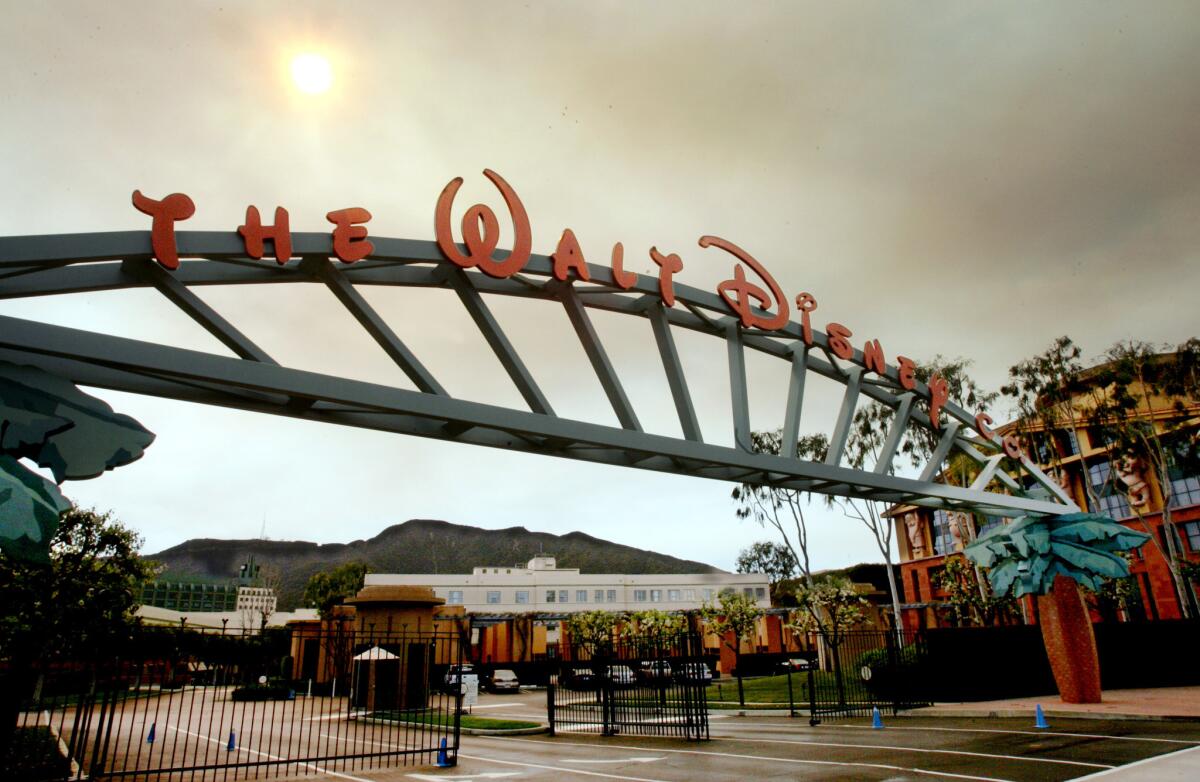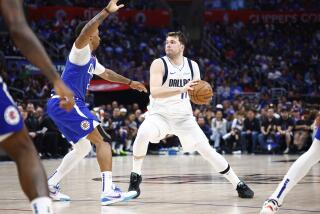Disney, Dish Network reach truce on ad-skipping AutoHop

- Share via
Walt Disney Co. and satellite TV provider Dish Network have signed a new long-term distribution deal that includes an agreement for Dish to disable its controversial ad-skipping feature for ABC network shows.
The two companies announced a comprehensive new distribution deal Monday night that includes breakthroughs in how digital media rights are treated.
The agreement marks a breach in the four major networks’ united defense against Dish Network and its ad-skipping technology called AutoHop: As part of the deal, Disney said it would drop a lawsuit.
The accord also signals a retreat by Dish, which had been winning preliminary court rulings in the high-stakes battle over AutoHop.
PHOTOS: Upcoming Disney spring films and beyond
Nearly two years ago, broadcast networks Fox, CBS, NBC and ABC sued Dish over the satellite TV company’s ad-skipping feature. The AutoHop function enables Dish subscribers to automatically record prime-time shows on broadcast networks and, with a push of a button, strip out all of the commercials.
On Monday, Dish agreed to disable the Autohop function for ABC shows for three days after a show is initially broadcast on the ABC network. Broadcasters want to protect that crucial three-day window because advertisers pay for viewers who record and watch programs within three days of a show’s network airing.
In exchange, Disney said it would withdraw its lawsuit against Dish Network over the ad-skipping technology.
It was unclear Monday how Disney’s decision to abandon the litigation might affect the lawsuits and strategy of the other networks.
In many ways, the Disney-Dish agreement could turn out to be a new template for other companies to follow. That seemed to be a goal of the Burbank entertainment colossus.
“We knew early on we had a responsibility with this deal to not only do what was best for our business, but to also position our industry for future growth,” Anne Sweeney, president of the Disney/ABC Television Group, said in a prepared statement.
“Not only were innovative business solutions reached on complicated current issues, we also planned for the evolution of our industry,” Sweeney said.
Financial terms of the new distribution deal were not disclosed.
Dish came away with new rights that will allow it to launch an Internet-delivered “over the top” subscription service -- something that pay TV companies have envisioned for the future.
Disney granted digital streaming rights for programming on ESPN, ESPN2, ABC Family, Disney Channel and its ABC TV stations.
Dish customers also will be able to access Disney-branded video-on-demand products, including the Watch ESPN and Watch ABC applications, in their homes and on mobile devices.
PHOTOS: Disney’s animated lineup: 1984 - 1994
Those offerings do not allow viewers to fast-forward through commercials, part of the industry’s strategy of attempting to preserve the lucrative economics of television. Major companies, including Disney and Comcast Corp., have been designing and promoting video-on-demand products that encourage people to watch their shows with commercials.
The companies said their new distribution deal also contains a framework to consider and adopt other advertising initiatives. Those include placing ads in content consumed on mobile devices and “dynamic ad insertion,” which would allow targeted advertisements to be added to programming.
The deal also conveys carriage rights for such new channels as Disney Junior; Fusion, which is Disney’s joint venture with Univision Communications; ESPN3; the Longhorn Network; and a planned SEC ESPN Network.
The deal renewed carriage agreements for the eight television stations that Disney owns, including KABC-TV Channel 7 in Los Angeles and WABC-TV Channel 7 in New York.
ALSO:
Justice Dept. sides with broadcasters in fight against Aereo
Academy Awards show advertising retains a golden aura
Oscars 2014: “Live with Kelly and Michael” keeps the party going
Twitter: @MegJamesLAT
Times staff writer Joe Flint contributed to this report.
More to Read
From the Oscars to the Emmys.
Get the Envelope newsletter for exclusive awards season coverage, behind-the-scenes stories from the Envelope podcast and columnist Glenn Whipp’s must-read analysis.
You may occasionally receive promotional content from the Los Angeles Times.










